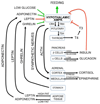AMP-activated protein kinase: maintaining energy homeostasis at the cellular and whole-body levels
- PMID: 24850385
- PMCID: PMC5693323
- DOI: 10.1146/annurev-nutr-071812-161148
AMP-activated protein kinase: maintaining energy homeostasis at the cellular and whole-body levels
Abstract
The adenosine monophosphate (AMP)-activated protein kinase (AMPK) signaling pathway arose early during evolution of eukaryotic cells, when it appears to have been involved in the response to glucose starvation and perhaps also in monitoring the output of the newly acquired mitochondria. Due to the advent of hormonal regulation of glucose homeostasis, glucose starvation is a less frequent event for mammalian cells than for single-celled eukaryotes. Nevertheless, the AMPK system has been preserved in mammals where, by monitoring cellular AMP:adenosine triphosphate (ATP) and adenosine diphosphate (ADP):ATP ratios and balancing the rates of catabolism and ATP consumption, it maintains energy homeostasis at a cell-autonomous level. In addition, hormones involved in maintaining energy balance at the whole-body level interact with AMPK in the hypothalamus. AMPK is activated by two widely used clinical drugs, metformin and aspirin, and also by many natural products of plants that are either derived from traditional medicines or are promoted as "nutraceuticals."
Keywords: energy balance; ghrelin; leptin; metformin; salicylate; traditional medicine.
Figures



References
-
- Akman HO, Sampayo JN, Ross FA, Scott JW, Wilson G, et al. Fatal infantile cardiac glycogenosis with phosphorylase kinase deficiency and a mutation in the gamma-2 subunit of AMP-activated protein kinase. Pediatr Res. 2007;62:499–504. - PubMed
-
- Amodeo GA, Rudolph MJ, Tong L. Crystal structure of the heterotrimer core of Saccharomyces cerevisiae AMPK homologue SNF1. Nature. 2007;449:492–5. - PubMed
-
- Anderson KA, Ribar TJ, Lin F, Noeldner PK, Green MF, et al. Hypothalamic CaMKK2 contributes to the regulation of energy balance. Cell Metab. 2008;7:377–88. - PubMed
Publication types
MeSH terms
Substances
Grants and funding
LinkOut - more resources
Full Text Sources
Other Literature Sources

